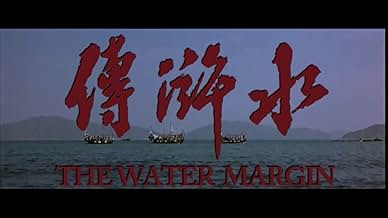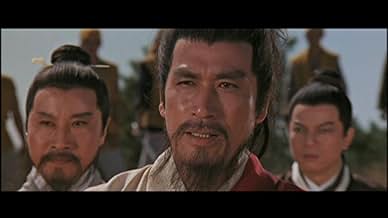Adicionar um enredo no seu idiomaSometime during the Song Dynasty, a band of martial artists form a private army to fight corruption. After trying to recruit two wealthy kung fu masters, one is arrested and sentenced to dea... Ler tudoSometime during the Song Dynasty, a band of martial artists form a private army to fight corruption. After trying to recruit two wealthy kung fu masters, one is arrested and sentenced to death, and the other seeks their help for a rescue.Sometime during the Song Dynasty, a band of martial artists form a private army to fight corruption. After trying to recruit two wealthy kung fu masters, one is arrested and sentenced to death, and the other seeks their help for a rescue.
- Direção
- Roteiristas
- Artistas
- Prêmios
- 1 indicação no total
Chen Kuan-Tai
- Tattooed Dragon Shi Jin
- (as Kuan Tai Chen)
Ku Feng
- Welcome Rain Sung Chiang
- (as Feng Ku)
Ho Bao-Hsing
- Master Tseng's Militiaman
- (as Bao-Hsing Ho)
Dik-Hak Chan
- Constable
- (as Ti-Ko Chen)
Chi-Ping Chang
- Constable
- (as Chi Ping Cheung)
- Direção
- Roteiristas
- Elenco e equipe completos
- Produção, bilheteria e muito mais no IMDbPro
Avaliações em destaque
It would be interesting to find out how the directorial chores were divided on this very enjoyable production. The style is consistent throughout most of the film except for some poorly shot opening scenes. Those who wince at the classic Chang Cheh red paint brutality will be relieved to know that it's limited to the very end of the film. The rest of the film is filled with good action and brisk plotting.
The film is filled with dozens of unique characters, all introduced with title cards even 90 minutes into the film. Readers of the famous book might be interested but most are useless to remember as they barely ever do anything. Fortunately the film has enough merit that you can easily watch without getting confused by the parade of introductions. The two Japanese leads are excellent as is the rest of the ensemble cast while David Chiang carries the majority of the film's personality.
There is a strong spaghetti western influence which is not a bad thing in this case. The music soundtrack seems to be entirely ripped off from other films. But the tracks stolen are mostly good, if unusual, choices.
The martial arts are frequently very good when Chiang's character is fighting. It's a version of Chinese wrestling that is not shown too often. Chuan Chen must have been the wrestling choreographer since his only other film credit is the sequel to this film. The weapon battles are early versions of the classic choreography of Liu Chia Liang and Tang Chia.
Many HK martial art dramas from this era are either too stagy or too brutal for my taste. This film strikes a good balance. Recommended.
The film is filled with dozens of unique characters, all introduced with title cards even 90 minutes into the film. Readers of the famous book might be interested but most are useless to remember as they barely ever do anything. Fortunately the film has enough merit that you can easily watch without getting confused by the parade of introductions. The two Japanese leads are excellent as is the rest of the ensemble cast while David Chiang carries the majority of the film's personality.
There is a strong spaghetti western influence which is not a bad thing in this case. The music soundtrack seems to be entirely ripped off from other films. But the tracks stolen are mostly good, if unusual, choices.
The martial arts are frequently very good when Chiang's character is fighting. It's a version of Chinese wrestling that is not shown too often. Chuan Chen must have been the wrestling choreographer since his only other film credit is the sequel to this film. The weapon battles are early versions of the classic choreography of Liu Chia Liang and Tang Chia.
Many HK martial art dramas from this era are either too stagy or too brutal for my taste. This film strikes a good balance. Recommended.
Based on historical events of the 12th century, "Water Margin" tells the story of 108 heroes referred to (by their enemies) as the "Liangshan bandits". They want to fight against a corrupt government, and therefore they ask 2 famous fighters to join them. These 2 are reluctant at first, but get into trouble with the so-called law very soon. Thus they don't really have freedom of choice anymore.
"Water Margin" is a fine example of Eastern classics produced by Shaw Brothers who got a cast full of stars together including Tetsuro Tamba as Master Lu. The best role, however, went to David Chiang as his right hand man Yen Ching, the Young Dragon. With irresistible charm, he defeats anybody - from pretty ladies to fierce fighters. The movie begins slow, introducing countless characters, but becomes very powerful and gripping in the second half. One recurring theme of the musical score seems to be inspired by Carlo Rustichelli's music for "I quattro dell'Ave Maria", which reminds the audience once again how often western movies and kung-fu cinema influenced each other. "Water Margin" was later followed by the sequel "All Men Are Brothers".
"Water Margin" is a fine example of Eastern classics produced by Shaw Brothers who got a cast full of stars together including Tetsuro Tamba as Master Lu. The best role, however, went to David Chiang as his right hand man Yen Ching, the Young Dragon. With irresistible charm, he defeats anybody - from pretty ladies to fierce fighters. The movie begins slow, introducing countless characters, but becomes very powerful and gripping in the second half. One recurring theme of the musical score seems to be inspired by Carlo Rustichelli's music for "I quattro dell'Ave Maria", which reminds the audience once again how often western movies and kung-fu cinema influenced each other. "Water Margin" was later followed by the sequel "All Men Are Brothers".
First time i saw this film was back when I was 5 years old. We had it in beta format. it was titled Seven blows of the dragon. The fight scenes and weapon usage is flawless. Epic. unforgettable. Last time I ever saw this film was more than 20 years a go. Now, amazingly, it has been released on DVD in it's original title on the Shaw Brothers DVD collection. ( Everybody note, the DVD title of this film is "The Water Margin" ) I also found a sequel of this film called "All men are brothers", but it's no where near as good as this film. Rent it, enjoy it. It will definitely build you up towards one of the most intense final confrontations you've ever seen on a kung-fu movie of this kind.
If you want a great martial arts flick with unbelievable choreography check this masterpiece out well worth your time to watch and savor!!!! David Chiang shines in this movie his grace and style is a wonder to behold.Hunt this movie down now! If you enjoy any kind of action/martial arts movie you will not be disappointed!
"The Water Margin" is based on a great ancient tale from Chinese literature. HOwever, it's not the entire story--just a small portion of the text "Shuihu Zhuan". I am certainly no expert on it--and that's a serious problem, as I had a lot of trouble understanding the context for the film as well as the sheer number of characters. Keeping track of them was impossible for me though I assume many Chinese viewers would be far more material with the characters and source material. I wish I could have sat and watched this with a Chinese scholar--and it's very likely you'll feel the same way. The story is about revenge and abuse of power--but I did have significant trouble following the story. And, although it's a Shaw Brothers film, martial arts are not that prominent in the movie. My advice is that if you know the story well, watch it. I have no idea how to score it for you. But, for the average fan of martial arts flicks who is NOT familiar with the story, I say skip it--it's just too confusing and the action isn't enough to keep your interest.
By the way, when this film began, my uncle turned to me and asked a very obvious question--'how are those boats moving so fast?'. This is because the ships' sails are not down and there are no oars--yet the ships are going VERY fast across the water! This is supposed to be the Middle Ages--yet the boats appear to be moving as a result of outboard motors. Could the ancient Chinese have been THAT clever? I think not--though they were darned advanced at the time!
By the way, much of the soundtrack for this film was 'borrowed' from the Hollywood film "Hang 'em High". It's pretty weird, as the original film was a western made to look and sound like a spaghetti western--and now it's in a Chinese martial arts film!
By the way, when this film began, my uncle turned to me and asked a very obvious question--'how are those boats moving so fast?'. This is because the ships' sails are not down and there are no oars--yet the ships are going VERY fast across the water! This is supposed to be the Middle Ages--yet the boats appear to be moving as a result of outboard motors. Could the ancient Chinese have been THAT clever? I think not--though they were darned advanced at the time!
By the way, much of the soundtrack for this film was 'borrowed' from the Hollywood film "Hang 'em High". It's pretty weird, as the original film was a western made to look and sound like a spaghetti western--and now it's in a Chinese martial arts film!
Você sabia?
- CuriosidadesSelected by Quentin Tarantino for the First Quentin Tarantino Film Fest in Austin, Texas, 1996.
- ConexõesFeatured in Kain's Quest: A Better Tomorrow (2015)
Principais escolhas
Faça login para avaliar e ver a lista de recomendações personalizadas
- How long is The Water Margin?Fornecido pela Alexa
Detalhes
- Tempo de duração2 horas 5 minutos
- Mixagem de som
- Proporção
- 2.35 : 1
Contribua para esta página
Sugerir uma alteração ou adicionar conteúdo ausente


































